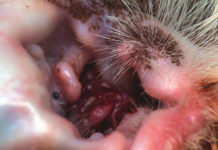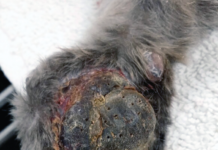Feline Ocular Post Traumatic Sarcoma
Tumors of the feline eye are relatively uncommon, but when they occur, they can significantly affect a cat’s quality of life and may be...
Ear-Canal Tumor Surgical
Q. I have a 16-year-old cat, and he has developed a tumor in his ear canal. It has been active and growing for six...
Tackling Mast Cell Cancer
Mast cell tumors are the most common feline cancer of the spleen, the second most common skin tumor (accounting for 8 to 21% of...
MOPP Chemotherapy Is a Viable Alternative
Lymphoma accounts for 30% of all forms of neoplasia in cats. Most feline lymphoma cases are characterized as medium to high grade, and multi-agent...
New Transitional Cell Carcinoma Treatment
Transitional cell carcinoma (TCC) is an aggressive, often metastatic, cancer. While a cure is not yet possible, veterinary care can slow its spread.
Symptoms include:
...
Grant Renewal
The Cornell University College of Veterinary Medicine, Petco Foundation, and Blue Buffalo renewed a grant that subsidizes the cost of cancer treatments for qualifying owners of dogs and cats.
Happening Now: New Clinical Trial
The section of Oncology at the Cornell College of Veterinary Medicine needs cats for a clinical trial on injection-site sarcomas (also known as a fibrosarcoma), a tumor that can arise following injections. Although the cause is unknown, treatments are available, such as the anti-cancer drug carboplatin.
Treatment Option for Feline Oral Squamous Cell Carcinomas
A new treatment called microbrachytherapy, which is used to treat inoperable feline oral squamous cell carcinomas, may be gaining momentum, according to a recent study published in Veterinary and Comparative Oncology.
Study to Develop Blood Biomarkers of Feline Cancer
Cancer is a leading cause of death in cats, with tumors in the mammary gland, mouth, and skin being the most common. Currently, we rely on surgical removal of the tumor or a biopsy for diagnosis, prognosis, and treatment options. Since this procedure often requires anesthesia, we would like to find a way to use a simple blood sample to provide these answers.
PumpkinA Food For All Reasons
Pumpkin is an excellent source of potassiuma mineral that is important for a variety of physiologic functions.
Pumpkin-A Food For All Reasons
Pumpkin is an excellent source of potassium-a mineral that is important for a variety of physiologic functions.
How to Handle a Finicky Eater
Some cats are just naturally picky and like to have variety in their diet, but changes in eating habits can also be a sign of stress or major illness.












